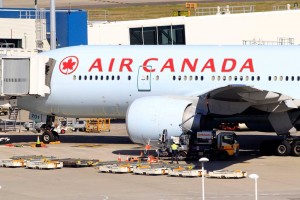A topic around my dinner table this week encompasses the issue of a $25 checked bag fee for airlines including WestJet and Air Canada (Evans). This issue intrigues me, as my family usually purchases the lowest-fee ticket option, which is the only class that the Air Canada baggage fee applies to. As learned through the business model canvas, Air Canada is altering its value propositions, and providing some of its customers with the choice of only paying for services they require. However, the company continues to provide the service of higher classes to fulfill the preferences of people with higher expectations and incomes.
On one side of the issue, Air Canada could be making more of a profit through ancillary revenues. Like Spirit Airlines, ancillary revenues account for around 40% of their revenue (Pittis). This change in parts of the company’s value propositions can attract more customers, since now commuters who regularly travel with no checked bags can take advantage of not paying the extra fee. However, customers of the economy-class may find it excessive for Air Canada to be charging extra fees, when these expenses should already be included in the ticket.
Through the analyses, as companies are finding news ways to cope with the rising costs of expenses, charging checked baggage fees may just be another strategy that will either bring Air Canada with increased profit, or even a decrease in the number of loyal customers.
Works Cited
Evans, Pete. “Air Canada adds $25 checked bag fee for economy travel.” CBCnews. CBC/Radio Canada, 18 Sept. 2014. Web. 22 Sept. 2014.
Pittis, Don. “Airfare discounts and the price you pay: Don Pittis.” CBCnews. CBC/Radio Canada, 16 Sept. 2014. Web. 22 Sept. 2014.
